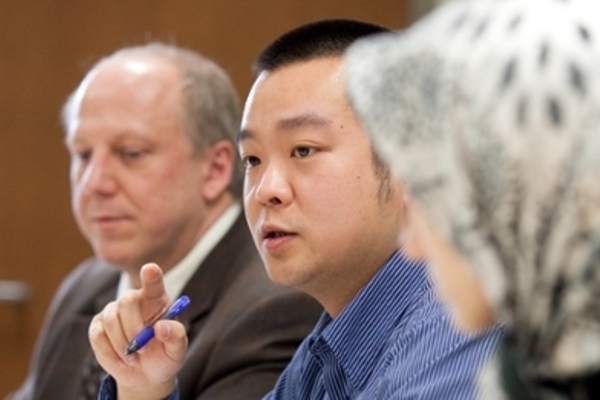
From waste management to a more sustainable future
As manager of Waste Stewardship and Recycling at the Ministry of Environment, Che-Wei Chung, MPA'13, is using skills honed in the Johnson Shoyama Master of Public Administration program to ensure a more sustainable future for the province.
By Bev Fast, Saskatoon-based freelance writerPeeling Away the Layers

Born in Taiwan, Che-Wei came to Canada as a high school student. After getting a bachelor’s degree in political science at the University of Lethbridge, he worked with the Town of Olds, Alberta for two years before enrolling in the MPA program at the University of Regina.
Che-Wei originally planned to study full-time and complete the program in two years. But life not only throws obstacles in our paths, it throws opportunities. This was the case when Che-Wei heard that the Saskatchewan Urban Municipalities Association (SUMA) was looking for a policy advisor. “I had already worked in municipal government in the policy area, so I thought, why not apply? I got the job and ended up doing my masters part time,” he says.
While it took longer to complete the program (he earned his MPA in 2013), Che-Wei developed a remarkable network that spans several student cohorts. “I still enjoy that network,” he says. “I often see former classmates, especially in Regina because a lot of JSGS grads work here. But I also see classmates who are working with the Alberta government.”
One of Che-Wei’s greatest take-aways from the MPA program was the ability to identify core issues. “When you’re talking about policy analysis, you’re talking about issues. But anytime you have a core issue, you also have a lot of symptoms, or complaints. At JSGS, I learned to peel away the layers to see the real issue. Once you can identify the issue, you can provide solutions, and when you do that, you resolve the challenges.”
The approach resonated because it was something Che-Wei had done instinctively during his tenure with the Town of Olds. “JSGS began to delineate an approach I had naturally taken,” he says. “I learned the process of identifying a core issue, separating it out from complaints and then taking steps to address the issue. I use this process in my job today, and I share it with my team. Anytime there’s an issue with a lot of symptoms, we work on peeling back the layers—the symptoms—until we identify the core issue.”
The MPA program also helped inform Che-Wei’s understanding of the tools of government, as well as how and when to use them. “Governments have four tools they can use to deal with issues: regulations, taxes, spending power and education. Once you understand the issue, you have a better understanding of how to use these tools to resolve it. You might use one tool, or several tools or a balance of tools.”
The tools are an integral part of Che-Wei’s job as manager of Waste Stewardship and Recycling. His team oversees recycling programs for electronic waste, used paint, used oil, scrap tires, beverage containers and, as of January 2016, packaging and paper waste.
“Each program, even ones that are well-established, required ongoing management and problem-solving. For example, every time we expand a program, such as adding a new item to the list of electronics that can be recycled, we have to identify the issues, do the research and consult with stakeholders to get their feedback,” Che-Wei says.
“We just launched the Multi-Material Recycling Program (MMRP) to manage packaging and paper waste through a cost-sharing initiative between businesses and communities. We needed to consult with industry, develop an industry-municipality cost share program, develop and pass a set of regulations, have industries submit their recycling plans. Once you launch, it’s still not done, because there are kinks to work out.”
Why are we so attached to waste?
“It’s surprising how passionate people are about waste,” Che-Wei says. “No one likes waste, but we all produce it—tons of it. And we’ve been producing it for thousands of years. It’s a by-product of our civilization and it’s not going away.”
But while our propensity to produce waste remains, Che-Wei also sees a growing push to reduce, reuse and recycle. “I think we’re building a more circular economy, one where we still produce products but where we also recycle our waste to produce other products,” he says. “Reduce, reuse, recycle is well underway, but it’s a big shift, and big shifts takes time.”
Another trend is having to pay for the waste we produce. In Saskatchewan, with our small population and expansive land mass, the idea of paying to dispose of waste generates passionate debate, both for and against.
“In other countries, we’re already seeing the trend in some EPR (extended producer responsibility) policies that extend producer responsibility to include fees to pay for the waste they produce. In countries that have a lot of EPR regulations, companies are changing their behaviors because now they have to pay for future disposal of the waste. As more and more Canadian provinces introduce EPR regulations, companies are gradually changing their behaviours. EPR regulations often get producers thinking of different ways to do things.”
For Che-Wei, it all spells opportunity. “In the future, I think we won’t see waste as garbage. I think a lot of so-called garbage will become a resource for companies to create by-products,” he says.

